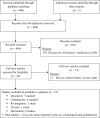The use of medications approved for Alzheimer's disease in autism spectrum disorder: a systematic review
- PMID: 25202686
- PMCID: PMC4141213
- DOI: 10.3389/fped.2014.00087
The use of medications approved for Alzheimer's disease in autism spectrum disorder: a systematic review
Abstract
Autism spectrum disorder (ASD) is a neurodevelopmental disorder that affects 1 in 68 children in the United States. Even though it is a common disorder, only two medications (risperidone and aripiprazole) are approved by the U.S. Food and Drug Administration (FDA) to treat symptoms associated with ASD. However, these medications are approved to treat irritability, which is not a core symptom of ASD. A number of novel medications, which have not been approved by the FDA to treat ASD have been used off-label in some studies to treat ASD symptoms, including medications approved for Alzheimer's disease. Interestingly, some of these studies are high-quality, double-blind, placebo-controlled (DBPC) studies. This article systematically reviews studies published through April, 2014, which examined the use of Alzheimer's medications in ASD, including donepezil (seven studies, two were DBPC, five out of seven reported improvements), galantamine (four studies, two were DBPC, all reported improvements), rivastigmine (one study reporting improvements), tacrine (one study reporting improvements), and memantine (nine studies, one was DBPC, eight reported improvements). An evidence-based scale was used to rank each medication. Collectively, these studies reported improvements in expressive language and communication, receptive language, social interaction, irritability, hyperactivity, attention, eye contact, emotional lability, repetitive or self-stimulatory behaviors, motor planning, disruptive behaviors, obsessive-compulsive symptoms, lethargy, overall ASD behaviors, and increased REM sleep. Reported side effects are reviewed and include irritability, gastrointestinal problems, verbal or behavioral regression, headaches, irritability, rash, tremor, sedation, vomiting, and speech problems. Both galantamine and memantine had sufficient evidence ranking for improving both core and associated symptoms of ASD. Given the lack of medications approved to treat ASD, further studies on novel medications, including Alzheimer's disease medications, are needed.
Keywords: Alzheimer’s disease; NMDA antagonist; acetylcholinesterase inhibitors; autism; medications.
References
-
- Developmental Disabilities Monitoring Network Surveillance Year 2010 Principal Investigators; Centers for Disease Control and Prevention (CDC). Prevalence of autism spectrum disorder among children aged 8 years – autism and developmental disabilities monitoring network, 11 sites, United States, 2010. MMWR Surveill Summ (2014) 63(Suppl 2):1–21 - PubMed
-
- Rossignol DA. Novel and emerging treatments for autism spectrum disorders: a systematic review. Ann Clin Psychiatry (2009) 21(4):213–36 - PubMed
Publication types
LinkOut - more resources
Full Text Sources
Other Literature Sources
Miscellaneous


